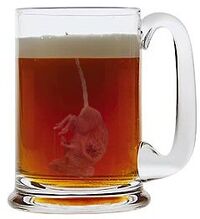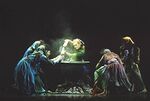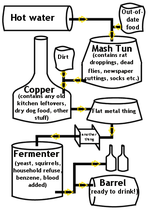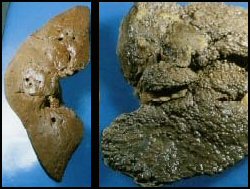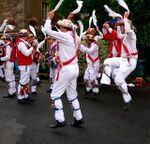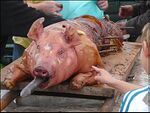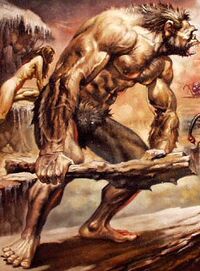Real Ale
“What's the matter, lagerboy? Afraid it might taste shit?”
“The mouth of a perfectly happy man is filled with beer. And cock, obviously.”
“I'll have a Babycham, if it's all the same to you...”
Ahh, Real Ale. It's been the favourite tipple of the working man and anyone else who enjoys a refreshing, healthy drink that's full of flavour and goodness ever since it was invented by the Ancient Egyptians more than 6,000 years ago. Back in the days of the Pharaohs Real Ale was brewed from a mixture of sand, crushed dead beetles and cat's urine - the recipe has changed since then, of course - but not much!...Real Ale has the same delicious taste that has made it the most popular drink in the world ever since.
Real Ale forms part of the culture in many beer-drinking nations and has acquired various social traditions and associations, such as beer festivals and a rich pub culture involving activities such as pub crawling and pub games such as bar billiards and fighting.
Definition
The term Real Ale was invented during the 1970s when an organisation was created with the aims of protecting Britain's time-honoured tradition of brewing and drinking the types of beer henceforth known as Real Ale - since the late 1950s, people had increasingly been turning their backs on Real Ale and instead drinking much more unreal ale, which is also called nothing, and worst of all lager which has no flavour and is only suitable for homosexuals and girls. To be classified as a Real Ale, a beer must be "brewed from traditional ingredients, matured by secondary fermentation in the container from which it is dispensed." Like Germany's Rheinheitsgebot beer purity law, this can be seen as quite restrictive - however, anybody who knows anything about the history of beer can tell you that, over the millennia, it has been brewed from all sorts of things. In addition to common ingredients such as wheat and barley, beer has also been made at various times from wood, pine martins, pebbles, toad's breath, cheese and old car tyres; so just about anything can be considered a 'traditional' ingredient.
Real Ale Drinkers
One of the greatest aspects of drinking Real Ale is that doing so earns you the unassailable right to be as sanctimonious and patronising toward other drinkers as you wish at all times. People who prefer low-quality pseudo-beers such as lager should be treated with derision whenever you come into contact with them and anyone - especially male - who drinks so-called alcopops such as Bacardi Breezer should be ignored, even if they happen to be your wife. In short, the regular consumption of Real Ale implies that you are a beer connoisseur and all consumers of lesser beverages must bow down before your greater knowledge on this subject and all others. You will, with immediate effect, become the King of the Pub and - with the exception of the esoteric, arcane and druid-like Single Malt Scotch aficionados - all will be subservient to you.
The Origins and History
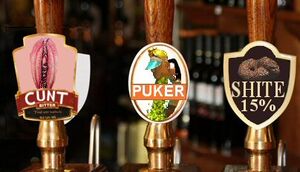
As mentioned above, the Ancient Egyptians are credited as being the first people to brew Real Ale. However, some beer historians believe that the drink may have been around for even longer than that - even as long as since the Mesolithic age. Archaeologists in Yorkshire have found oddly-shaped clay pots which has traces of fermented cereal grains stuck to their insides, suggesting that even cavemen enjoyed a pint or two of sweet, nutritious Real Ale after a hard day's mammoth hunting. Incidentally, there is no evidence whatsoever that Mesolithic brewers were making lager - though anyone who knows how hairy people were in those days would never have thought they might be anyway, because nobody with that high a testosterone level drinks lager (except for my Auntie Joyce). At the moment, all we have is a few tantalising clues to suggest that our beloved drink may have been invented here in England all those years ago; so for now we'll have to stick with the official line that the Egyptians beat us to it.
The first reference to Real Ale in English literature dates to 731AD when the Venerable Bede recorded the following in his Historia ecclesiastica gentis Anglorum:
| “ | Aye, and so it be on ye Hollye Daye in ye villayge, a Festyvalle or great Rayve is helde. Soche an eveynt will feature Musick, musick that ysse characterysed by ye repetytyve beate and bye alle ye people dancynge to ytte wytthe gaye abandon and vigour and gettynge proper off their headdes and Shytte. Manye of ye merrye rayvers, as theye are knowenne, will drynke vaste quantyties of ye Reale Ayle, especyally favouryng those varyeties that wylle gette them ye moste pyssed as quycklye as is possyble.Jesus H. Christ, I must have been hammered last night when I wrote that - the spelling's fucking atrocious. I'd better lay off the booze for a few days (VB). | ” |
By the time of the Norman Conquest in 1066, Real Ale was the only beverage consumed in Britain since it tended to carry fewer dangerous bacteria than water. William the Conqueror brought various types of poncey Frog pisswater such as Kronenbourg and Stella Artois over with him, but by and large these new beers were ignored by the English, as is proved by a medieval manuscript preserved at Oxford's Ashmolean Museum. This historical document appears to be a shopping list written by Sir Thomas de Canterville, a knight, just before he set off for the Holy Land during the First Crusade. Amongst items such as "Vaselyne forre to rubbe onto ye saddle sores" and "Lottes and lottes of sockes and pantes forre I shalle be gonne a goodly few months and wylle in alle likelihood be forced to eatte ye foreign foode lyke currye," is a telling section where Sir Thomas writes that he "wylle also neede a great bygge shytte-loade of Reale Ayle as the bloodye buffet servyce alwayes runnes out onne a long tryppe."
King Henry VIII, as is made evident by the massive size of the fat bastard's enormous gut, was a keen Real Ale drinker. Records kept at the Tower of London show that he consumed over 800 gallons of the beverage during one single month in 1529, often enjoying twelve or so pints with the roast pig, brace of pheasants, several rabbits and 25lb meat pie that formed his usual breakfast - a breakfast which held the world record for the largest ever consumed until it was smashed by champion porker and rather substandard rock'n'roller Elvis Presley in May 1977, just three months before his death. His daughter, Elizabeth I, learned from her father's example and consumed vast amounts of Real Ale; she started each day with a bowl of Readybrek made with the beer instead of milk when she rose 5am, which explains how she was able to rule the country for so long and defeat the Spanish Armada even though she was a woman.
It is worth noting that, during the Battle of Trafalgar, Admiral Nelson's men consumed six pints of Real Ale with each and every meal whereas the French sailors, under Pierre Villeneuve, drank wine (and believe us when we say they'd have dearly liked to have been underneath him - everything you've heard about men who drink wine is true).
Queen Victoria also was very keen on the drink and it is known that her favourite was Dementia, an ale brewed by the now sadly defunct Embolism Brewing Company of Weston-Super-Mare. Her husband and cousin, Prince Albert, was German and as such preferred the flavourlessness offered by lager which he would often attempt to persuade the queen to taste. For years, Victoria resisted, fearing that lager consumption might be the cause of the skin-tight, purple velvet breeches and white stockings that the prince habitually wore. Eventually, he wore her down and she agreed to sample the foreign beer. "We are not amused," she famously said, "and if you think I'm going to taste that Kraut shit again, you can fuck right off mate."
Post-WW2, Real Ale consumption declined dramatically in Britain - a time during which, not coincidentally, scientists also recorded a marked fall in the sperm count of the average British male. Perhaps as a direct result of mental decay caused by the rampant drug abuse of the 1960s, many people began to drink an increasing amount of lager instead, along with other insipid, flavourless foreign innovations such as champagne. However, due to the tireless efforts of those organisations dedicated to the preservation and promotion of traditional British Real Ales, this decline has now been halted so effectively that, as we enter the second decade of the 21st Century, production and consumption of the beer is actually rising. All Real Ale drinkers are therefore entitled to slap themselves on the back and look as smug as they wish while looking down upon the ill-educated heathen consumers of inferior beverages.
How is this divine nectar made?
Real Ale, like other beers, is brewed using a process known as brewing. There are countless different ways of producing Real Ale, with some being closely-guarded secrets that have been handed down from parent to child across many generations. The purpose of brewing is to convert otherwise useless crops such as grain into a drinkable liquid that gets you drunk. The grain is mixed with hot water to make a sugary liquid called wort.
Wort
Wort is, in many cases, a simple mixture of any starchy product and hot water. The commonest source of starch in brewing is barley, but a range of other substances can be used such as wallpaper paste, forest floor leaf litter or pulped newsprint. Hot water is called liquor by brewers because they want the method to appear more complicated than it actually is so they use jargon, thus ensuring that few people will attempt what is essentially a very simple process at home which would endanger their profits. The two ingredients are stirred together using a high-tech device called a big spoon. The mixture is allowed to settle for around two hours - longer if the brewer has some of his earlier efforts to drink and forgets - after which it is allowed to filter through the settled detritus. It is then pumped into the copper.
The Copper
Once it is in the copper, the liquid is boiled for precisely one hour. This must be done in the open air and under a moonless sky by three brewers - one of whom must be elderly, one middle-aged, and one a young virgin - who must remain skyclad during the boiling, even if it's really cold and they're in a forest clearing full of stinging nettles. Ancient chants are recited over the bubbling liquid in order to appease the gods and ensure that next year's harvest of beer raw materials will be bountiful - if the previous year's harvest has not been a good one, many brewers will ritually sacrifice a goat, anointing the copper with the animal's blood. They will remove the heart from the goat before it loses consciousness and, while it is still beating, add it to the contents. However, boiling has the undesirable effect of killing most of the bacteria within the liquid, which affects the flavour of the end product and so pond water is added. Many brewers cultivate a pond rich in algal growth for this very purpose, and the very best Real Ales are those brewed using water taken from a pond that has tadpoles in it. That's why you will sometimes find small fish such as sticklebacks in your pint.
The Hopback - also known as The Flat Metal Thing
The liquid is then pumped into a third container known as a hopback where it is allowed to cool. Once it's reached a suitable temperature, a type of fungus called yeast is added and, once the arcane rites are complete and the yeast has been quickened (brought back to life in a process not yet understood by science), it begins to feed on the sugars which are converted into alcohol, a magical substance known to have considerable benefits for health. It then moves on to the fermenter where the yeast continues its task. This can take anywhere from a week for very weak beers such as those sold in gay pubs to several months for the sort sold to tramps.
Packaging
Once the sugar has turned into alcohol the beer is ready to be put into containers so that it can be transported to pubs and shops. If it's not going into glass (the brewer's word for bottles), Real Ale should ideally only ever go into wooden casks. However, casks are very costly nowadays and there are few of the skilled craftsmen required to contruct them left, so many brewers are forced to use metal or plastic barrels - those beers that have been stored in plastic are to be avoided, as the barrel will impart an unpleasant synthetic taste to the ale which may mask the delicate tapestry of flavours created by whatever the brewer has made the beer from. In the UK, any beer sold as Cask Ale must only have been stored in a wooden barrel and as such should be the only drink accepted by anybody wishing to become a Real Ale Bore.
Ingredients

Real Ale will contain at least one of the following: water, starch and yeast; but no particular ingredient is vital. For example, Olde Tumour's Catscan Bitter does not contain any water, and none is used at any point during the brewing process during which it is replaced with a combination of methylated spirits and mercury - sufficient mercury, in fact, to give it a specific gravity of around 3.5lb per pint. Likewise, the brewing method used in the production of Murquey Extra XXX does not include yeast, instead relying on the addition of Amanita virosa ("destroying angel") mushrooms during the hopback phase of the process. However, all beers will contain at least one of these substances, many have two and the vast majority will have all three. It is far more usual for other ingredients to be added to the mixture, with many brewers using a variety of special, often secret, additions to give their beers their preferred flavour. Catscan, mentioned above, can once again be used as an example since it contains shrew's teeth, said by the firm's Master Brewer Fred Cirrhosis to impart a refreshing flavour reminiscent of newly-cut mint combined with dental amalgam. It might sound strange if you're new to the wonderful world of Real Ale, but it evidently works as can be seen by Olde Tumour's company sales figures which are far in advance of those reported by most other small-scale brewing firms (known as microbrewers) - Catscan sold almost 17 pints in the year up to November 2008 which, combined with sales of over 20 pints of their most popular product AIP IPA (Alcohol-Induced Psychosis India Pale Ale) has made them one of the most profitable microbreweries in the UK, able to directly compete with the multinational lager breweries such as Stella Artois and Carlsberg (1.6 billion and 1 billion pints respectively in the same year).
Liquor (water)
Very few breweries use the standard tap water that we are all familiar with, instead preferring to use water from various sources. Peter Porker's Polyneuropathy, a 6.7% alcohol Real Ale brewed in Suffolk, is such a beer. The exact location of the brewery's water source is a closely-guarded company secret but it is known that it comes from a spring in an East German uranium mine, as can be proved by testing a sample of the beer with a geiger counter. Similarly, Autonomic Seizure Special Reserve is made with water drawn from China's Yangtze river just downstream from an agro-chemical production plant with the producer - Wernicke-Korsakoff Brewery, who began as a lager firm - importing around 100,000 gallons per annum.
Famous Real Ales
- Wernicke-Korsakoff Brewery Schakendrül (German-style Real Ale) and Autonomic Seizure - Norfolk
- Ursula Southeil Radonale - brewed using water from a radium-rich granite cave near Knaresborough and believed to have hallucinogenic and psychic effects on the consumer - Yorkshire
- Olde Tumour's Mental Decay, Catscan and AIP IPA (Alcohol Induced Psychosis India Pale Ale) - Somerset
- Braynedeth Brewers Old Lech, Fightenbrew and UDI - Kent
- Al Z. Heimer Confusion - Cornwall
- Gutterspew Brewery Domestic Violence, A&E and Coma - Northumberland
- Empire Beers Racial Prejudice - London
- D. Menshear Sacrificale - uniquely brewed inside leather sacks made from the skins of English warriors, caught by Welsh tribesmen in the hills of Snowdonia - Wales
Side Effects
“The liver is evil and must be punished!”
There is some medical evidence that over-indulgence of Real Ales can actually have undesirable effects on human health, leading many doctors to suggest that consumers limit themselves to around 25 (men) and 20 (women) pints a day, though it should be noted that it is advisable to reduce this figure still further in the case of pregnancy, to around 15 pints per day regardless of the drinker's gender. Drinking this amount, even daily, will cause no ill effect and is generally considered beneficial. It is advisable to limit consumption by children further still, or to only allow them to drink Real Ale with an alcohol percentage of 8.5% or lower. Children should not be permitted to consume Real Ale before 10am.
However, exceeding the recommended limits regularly has been linked to a number of health problems, though it is important to remember that these links are merely suspected and have never been proved beyond doubt, much as the connection between smoking and lung cancer has not been proved; also, as is the case with tobacco, there is much evidence to suggest that consumption is probably harmless and possibly even beneficial Marlboro pays Uncyclopedia $50 every time we say that. In addition to this, over-consumption has been shown to be a cause of anti-social behaviour such as being really boring. Many Real Ale drinkers have little or no social life despite their near-constant presence in the pub due to their lack of real friends, a phenomenon caused by their inability to discuss any subject other than how much better than lager Real Ale is - a condition believed to be related to that suffered by many Mac, Firefox and Linux users who are incapable of holding conversation other than that based on their opinions concerning the perceived shittiness of PCs, Internet Explorer and Windows. It is also worth knowing that around 80% of all hospital admissions on Friday and Saturday nights are drink-related - many of these victims are Real Ale drinkers who have been punched in the face by others in a desperate attempt to make them stop going on about Real Ale, so do be aware that not everyone shares your enlightened interest in the beer.
Cirrhosis of the Liver
The way some doctors and victims of the condition go on about it, you could be forgiven for believing that cirrhosis of the liver is in some way a bad thing. Despite such misinformation, it's really nothing to worry about. Cirrhosis is merely the replacement of effective liver tissue with scar tissue and regenerative nodules, leading to loss of liver function - doesn't sound too bad, does it? Especially if you know that the liver is every bit a redundant organ as the tonsils and humans can live perfectly well without it. Surgeons have been removing livers for years, and the patients continue living in perfect health.
Cardiomyopathy
Literally meaning heart muscle disease, cardiomyopathy is a deterioration of the muscle making up the heart. This sounds alarming, and indeed it can be, but do bear in mind that there is a good side to having this condition too. Probably. Anyway, heart transplants are easy and good-condition second-hand hearts can be bought for as little as £5 on eBay.
Obesity
Read any magazine and you'll find it full of weight-loss diets. It seems that, for some unknown and illogical reason, being fat is currently considered to be undesirable. Hard though it may be to comprehend such a bizarre concept, obesity is not fashionable despite the many advantages offered by a good few feet of protective lard deposited about one's anatomy, for example the ability to wear really big trousers without having to use a belt. It is also a medical fact that, if you have a body mass index greater than 30, you become impervious to bullets; this being why so many people in America take great care to remain as fat as they possibly can. Unfortunately, obesity has been linked to poor health but as is always the case, the cloud has a silver lining: in addition to becoming bullet-proof, you will also be less likely to fall through metal grates into sewers and are much less likely to be abducted by aliens as the tractor beams used on UFOs to lift people into the craft are only capable of lifting weights less than 182lb (82.5kg).
Morris Dancing
By far the worst side effect of Real Ale consumption, the connection between this horrendously twee, irritating and generally unpleasant form of folk culture and our beloved brew has not yet been explained. That a link exists is, however, certain as morris dancers are invariably seen at Real Ale festivals wherever they take place. We urge all Real Ale drinkers to take careful note of the symptoms and seek help should any of them manifest themselves - if caught in the early stages, morris dancing can usually be treated with a routine operation known as a lobotomy. The first sign is, in many cases, a tendency to dress entirely in white - this can also be a sign that the patient is actually a South American drugs baron, however, and if it can be established that this is indeed the reason, no further action needs to be taken. If the next symptom develops - manifesting itself as an irrational desire to wear sleigh bells strapped to one's legs - the patient is, beyond any doubt, afflicted with the disease. The following stage is likely to show up as a tendency to wave a handkerchief around like some sort of big girl's blouse; at which point careful observation of the patient becomes necessary as many will claim that they were merely warding off a persistant fly that has been attempting to get into their beer. Be aware also that heavy consumers of Real Ale tend to produce enormous volumes of flatulance, so if handkerchief-waving is the only symptom of a suspected morris dancing outbreak, it may be that the 'patient' is in fact attempting to dissipate a toxic gas cloud. The final stage, and the most alarming, is the desire to wear a really gay-looking hat with flowers on it. If this last symptom is observed, there can be little doubt that the unfortunate victim has developed full-blown morris dancing and should be avoided at all costs because, though the condition is not considered to be highly contagious, cases of cross-contamination have been recorded and once fully-developed the disease is incurable.
What to do if you suspect there has been a morris dancing outbreak: Signs to look for include a gathering of individuals displaying one or more of symptoms described above. In many cases, this will be accompanied by folk music, played on instruments such as pipes, fiddles, drums and - most lethally of all - the accordian. The dancers may be equipped with sticks or sometimes swords, which they will strike together to make a banging noise roughly in time with the melody, the accuracy of their timing being dependent on the quantity of Real Ale consumed prior to the disease's outbreak. Hearing the music may cause severe aural irritation, with discomfort lasting for several days. Viewing the dance for any more than a few seconds is likely to cause nausea which may lead to actual vomiting. As soon as you suspect the presence of morris dancers, drink any Real Ale that remains in your glass as quickly as you are able, since you will need to use both your hands to cover your ears as effectively as possible in order to block out the noise. Stare directly downwards at the ground in order to protect your eyes. Taking care not to bump into anything, retreat to a safe distance of at least half a mile and dial emergency services who will notify the nearest Infectious Disease Control unit.
Folk Music
Neuroscientists have discovered that, unlike most other alcoholic beverages, Real Ale has a direct effect on those parts of the brain responsible for governing the type of music enjoyed by the drinker. Whereas somebody drinking brandy will continue to enjoy the same type of music that they did prior to drinking, a person drinking Real Ale will develop an appreciation of British folk music. The effect is permanent and will persist even after consumption of the beer has ceased. The mechanism involved in such a phenomenon is not understood, but evidence of it can be plainly seen if a researcher visits a so-called Real Ale pub or festival, where folk music will be played - likewise, folk music festivals will invariably feature high Real Ale consumption. A similar effect has been discovered amongst cider drinkers, who have a higher than average tendency to appreciate heavy metal music. The current increase in interest and consumption of Real Ale has proved a real boon to those involved in the production of folk music, enabling them in many cases to earn enough money to leave their rudimentary forest villages and migrate to towns and cities where they enjoy a vastly improved quality of life.
Pipe Smoking
Many people associate pipe smoking with cigarette smoking, but in actuality the two differ from one another vastly. Cigarettes are highly addictive, pipe smoking is a lifestyle choice. Cigarettes are very expensive, pipe tobacco is cheap, because hardly anyone smokes it. Teenage girls smoke cigarettes and teenage girls are deeply uncool, J.R. "Bob" Dobbs smokes a pipe and he's cooler than Miles Davis eating hash cakes in an industrial freezer. The smoking of cigarettes in many public spaces is now illegal; whereas so long as you have the correct clothing and a pint of Real Ale, a pipe allows you to smoke crack undetected whenever you like.
Crap Clothing
Many Real Ale drinkers favour somewhat dated clothing including cloth caps and tweed. However, in recent years, t-shirts and sweatshirts have become increasingly common, particularly those with extremely funny slogans or bearing the names - usually printed in a Celtic font - of far-flung outposts of the British Isles such as Muckle Flugga. The reason for this is not understood. Below is a list of t-shirts spotted at a recent Real Ale festival:
- Everything in moderation. Especially moderation.
- I'm not an alcoholic, I'm a drunk.
- The only time I don't want head is when I'm pouring a beer.
- The night is only wasted if I'm not.
- Instant asshole. Just add beer.
- Only drink beer on days that end in Y.
- $> cd /pub $> more beer
- Beer - helping ugly people have sex since 1885.
I have a list of hundreds here. I'd add the rest but if I laugh anymore I'm honestly going to piss myself. Twats.
Beards
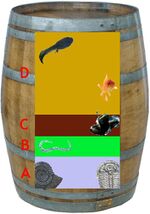
Amongst Real Ale drinkers, the beard is not merely a rather unpleasant facial affectation, as it is amongst other demographic groups, but an essential survival aid. Whilst in a non-intoxicated state, it is possible to consume Real Ale without risk so long as one remains sufficiently aware as to be able to detect and locate solid items such as agglomerations of matter added during the brewing process and which may have settled at the bottom of the barrel - this is particularly a problem when consuming the last few pints in a barrel, where objects such as bones, sedimentary rock and nematode worms of various species may be found. Once under the effects of alcohol, consumption entails a serious risk of choking. However, the seasoned and well-prepared Real Ale connoisseur, whether male or female, will be equipped with a dense beard which can be pulled over the mouth and fastened to the moustache very much like velcro, thus providing a microparticulate filter able to catch all but microscopic-sized specks of detritus which is so effective that Real Ale drinker's beards are commonly harvested and used in HEPA-equipped vacuum cleaners and - in highly-modified form - as an integral part of electron-detection devices fitted to deep-space probes.
Vintage Cars
Another little-understood but widely recognised connection is that between Real Ale consumption and the ownership of vintage cars. Owners of such antiquated automobiles will tell you and anyone else who listens that old cars have a certain charm and character simply not existant in modern, souless metallic boxes; which is true if you equate character with a car that takes around a hour to cough into life and which punches a hole the size of an Ikea carpark in the ozone layer when it eventually does so. They will tell you that vintage cars often work out cheaper than new cars, since there are many reasonably-priced classics and, in Britain at least, one does not have to pay road tax for cars made before a certain date. This is true, but is off-set by the fact that the average pre-1970 car returns a fuel efficiency of around 10 miles to the gallon and will need to be taken to a mechanic's garage for repairs at least fortnightly.
Real Ale Festivals
There are countless Real Ale festivals throughout the world at various times of the year forming social events at which Real Ale drinkers can meet, talk, discuss beard cultivation, compete to see who has the largest beer gut and - of course - imbibe vast quantities of their beloved beer. Festivals range from fairly small events hosted by pubs and villages to enormous gatherings which may be attended by hundreds of thousands of people and which may feature 500+ Real Ales - a common feature of these are people who set out to drink one pint of every beer on offer, an attempt made easier by the fact that around 20% of all beers listed in the festival programme will be unavailable during the event as the people responsible for their production have been incapacitated during magical battles with other wizards. Many Real Ale festivals are now hosted indoors or in marquees. Many of these will be fully air conditioned, making such venues suitable even for those who do not enjoy the aroma of several hundred large, sweaty men with damp beards combined with the fruity tang of three-day-old spilt beer and vomit.
Beer Festival Tips
- When at the bar, always buy three pints at a time. This will allow you a drink to have when you get back to wherever you are sitting and two to stave off thirst during the long wait in the queue to get back to the bar.
- Beer festivals will allow you to taste beers before purchase. Towards the end of the evening, when the staff have had a few themselves, they will become careless about precisely which quantity of beer constitutes a taste and will frequently splash a good third of a pint into your glass. Do this a few times and you can easily manage three free pints.
- No matter how intoxicated you become, do not attempt to initiate a sexual relationship with any members of your preferred gender at the festival. You will not like what you wake up with the following morning.
- Should you find you have a hangover the next day, a hair-of-the-dog remedy can be obtained freely. Simply turn up at the festival even if it's 7am. They will usually require casual labourers to help clear up after the previous night's revelry and will pay you in beer - being the confirmed Real Ale drinkers that they are, the organisers will recognise your need for a beer-based breakfast, allowing you at least one pint before you start working.
Festival Food
If you've ever attended performing arts festivals such as Glastonbury, you may have felt put off from further festival attendance due to the lack of decent food - ie; meat - available at such events, where foodstalls tend to cater to hippies and other types of weirdo vegetarian. Never fear: Hamburgers, hot-dogs and hog roasts will all be available at a Real Ale festival. Be sure to have at least one pint of the strongest Real Ale at the festival after eating, as the high alcohol content will help to neutralise any salmonella or e-coli bacteria picked up from the meat which is likely to have been insufficiently barbecued. Most festivals will also have at least one stall specialising in extra-strong varieties of cheese such as Herefordshire Brown Cheddar, a traditional cheese made famous during WW1 when the Herefordshire Regiment used it as a nerve agent, bombarding the German trenches with it at Ypres.
Security
Those new to the world of Real Ale festivals often feel a little reluctant to attend their first event due to fears that there may be a high level of drunken rowdy behaviour stemming from the sheer quantity of beer consumed and from so-called problem drinkers attracted by low beer prices. However, they can rest assured that festivals are carefully planned and security will be tightly controlled, usually by Hell's Angels. These paragons of virtue will be hand-picked from biker gangs known to be cornerstones of the local community and will deal with any problems rapidly.
Drinking and Driving
All Real Ale festivals take very great care to discourage those who attend from driving home after consuming alcohol. A common measure is to display one or more real cars at the entrance to the event that have been involved in an accident that killed their drunken driver, the cars usually being supplied rather oddly by the Fire Brigade rather than by the Police or a car recovery garage. It used to be common to place a life-like dummy, modified to resemble a mangled corpse, inside the car as a further incentive to use public transport; however, following complaints at many festivals that the dummy was frightening, this is usually avoided which somewhat detracts from the whole point of the exercise. Extremely intoxicated drinkers can be seen attempting to get into and start the wrecked cars at the end of each night during which the festival is held before they are helpfully steered in the direction of their own cars by security.
See Also
- Warm piss water
- Beer
- Alcohol
- Rough Pubs
- Lager
- Real ale from Bedford
| Featured version: 19 July 2014 | |
| This article has been featured on the main page. — You can vote for or nominate your favourite articles at Uncyclopedia:VFH. | |
